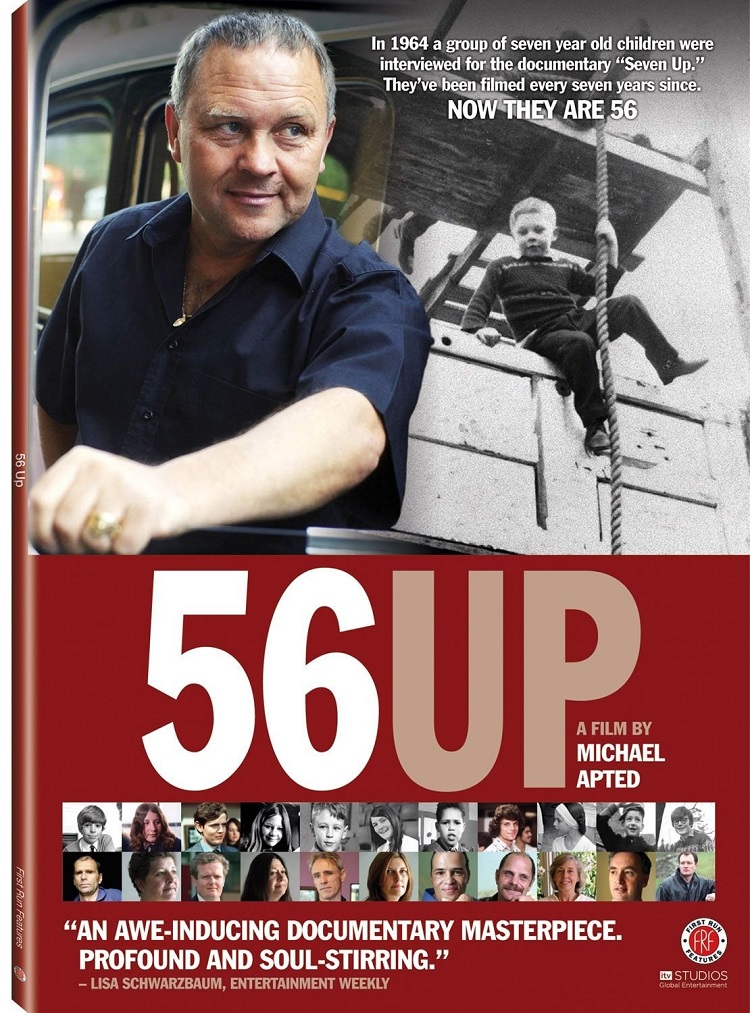
For nearly 50 years now, a group of ordinary English citizens have been participating in an ongoing sociological study that checks in on them every seven years. Esteemed feature film director Michael Apted (The World is Not Enough, The Chronicles of Narnia: The Voyage of the Dawn Treader) has been involved from the very beginning in 1964 when the subjects were just seven years old, and returns here once again as the director and interviewer. Now the subjects are 56 years old. If you’ve seen any of the films in the series, you’ll know exactly what to expect here, but newcomers needn’t be apprehensive about lacking the history as this entry once again incorporates footage from all previous films to get all viewers up to speed.
The original concept for series debut 7 Up was to interview 14 children from diverse socio-economic backgrounds from all parts of England to investigate whether a class system was still in place. Of course it was, and still is, and a few of the 56 years olds now mock that mission statement and express relief that the series gradually veered away from its initial foolish intent in order to focus solely on the subjects as unique individuals. And what a diverse lot they turned out to be, although offering very little deviation from where we might have expected them to end up based on their childhood introductions. Apparently the Jesuit maxim that has always served as a touchstone for the series is true: “Give me the child until he is seven and I will give you the man”.
Amazingly, almost all of the original 14 participants are back for 56 Up. Even more shocking, one of the participants returns after being absent for the last 28 years. Nobody has died, nobody is in ill health, they’re all just keeping calm and carrying on in that distinct English manner. That’s not to say they haven’t had their issues, but while they recount their regrets and losses they uniformly seem at peace and appreciative of how their lives have turned out. That’s likely the biggest change since 49 Up, as there was a prevailing sense of disappointment then regarding failure to achieve their individual ambitions that has now largely dissipated. They enjoy their families, watching their children and grandchildren grow up, and are settling comfortably into the final stages of their professional careers. Again, nothing earth-shattering, but just the fact that we’ve been allowed to watch these ordinary lives play out in public over a 50 year timeframe is completely amazing and worthy of attention.
As the series has progressed, the spouses of the subjects have become subjects themselves, and while we’ve lost a few to divorce (and one recent death) along the way, the remaining ones continue to offer valuable insight into the lives and attitudes of the principals. That’s as far as the series intrudes, as it has always avoided sharing the thoughts of the offspring, keeping the focus solely on the original generation. We see pictures and background video of the kids and grandkids, but they’re very clearly defined as just scenery, not subjects themselves. Surely this is at least partially at the behest of the primary subjects who continue to question the toll the series has taken on their own lives. A couple even go so far as to once again express their hatred of the intrusion but just can’t bear to give it up after being involved for nearly their entire lives.
My favorite participants continue to be Neil and Tony. Neil is the black sheep of the group and has drifted the furthest from his bubbly childhood personality, suffering mental illness and homelessness on his twisting journey to middle age. Here he’s still painfully poor, socially awkward, unmarried, but making a go of things as a smalltime political member in a small town. It’s always a mystery what he’ll be up to in any given installment, so it’s rewarding to find him experiencing some scant level of stability here. Tony has always had an affable, larger-than-life personality that served him well through forays into jobs as a jockey, actor, and cab driver, and his likability this time around extends to the biggest surprise of the entire film which is saved for the very end. Let’s just say it involves his return to the old track where he used to jockey in his 20s.